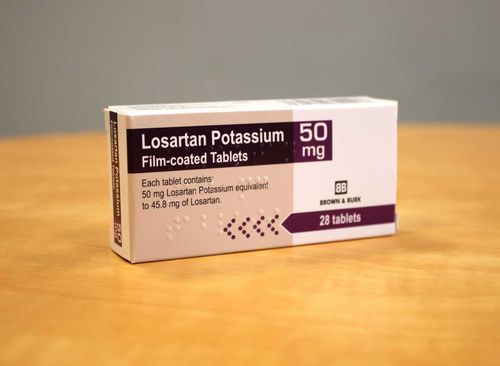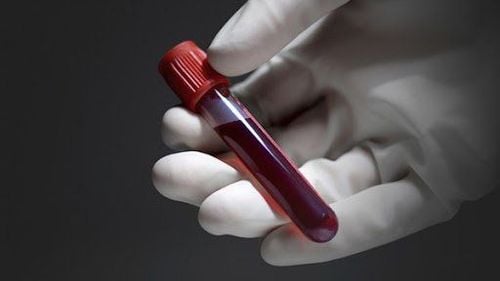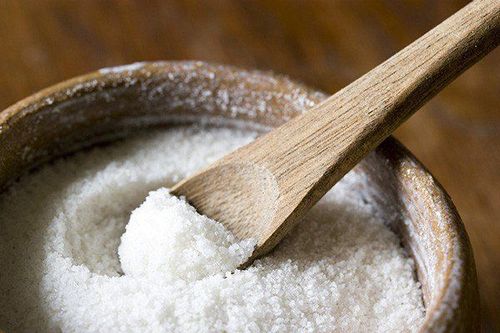This is an automatically translated article.
Your kidneys are bean-shaped organs that perform many important functions. The job of the kidneys is to filter blood, remove waste through urine, produce hormones, balance minerals, and maintain fluid balance. There are many risk factors for kidney disease. Avoiding or limiting certain foods in your diet can help you reduce the buildup of waste products in your blood, improve kidney function, and prevent further damage. The following article talks about the 20 best foods for people with kidney disease.1. What to eat with kidney disease?
1.1. Why is an eating plan important? The food and foods you eat and drink affect your health. Staying at a healthy weight by eating a balanced, low-salt, low-fat diet can help keep your blood pressure under control. If you have diabetes, choosing the right foods and drinks can also help control blood sugar. Controlling high blood pressure and diabetes can help prevent kidney disease from getting worse.1.2. Healthy Diet Basics For any healthy diet, you need to know how much certain nutrients you are getting, for example:
Calories Protein Fats Carbohydrates To ensure that you are getting the right amount of this nutrient you need to eat and drink the right portions. If the food is packaged, use the nutrition information on the food label to learn more about what's in the food you plan to eat. From this information you will be able to choose foods that are high in the nutrients you need and low in the nutrients you should avoid or limit.
Calories: Calories get from protein, carbohydrates and fats in your diet. Your body's calorie needs vary with age and sex, depending on your body size and activity level. Calorie intake also varies with each person's weight goal. Some people will limit the calories they take in, but others will need more. If you want to know your calorie needs, you must work with a dietitian to create a plan of adequate calorie intake. Protein: also known as protein. Humans need protein to grow, recover, and stay healthy. Having too little or too much protein is a health concern. Too little protein can make your skin, hair, and nails weak. Each person's protein needs depend on body size, activity level, and health concerns. Foods rich in protein include: Red meat, poultry, fish, eggs. Carbohydrates: also abbreviated as carbs – this is the easiest type of energy for your body to use. There are many sources of healthy carbs including fruits and vegetables. Good sources of unhealthy carbs include sugar, honey, candy, soft drinks, and other sugary drinks. Some carbohydrates are high in potassium and phosphorus, so limiting depends on the stage of kidney disease. Carb intake needs to be monitored more carefully if you have diabetes. Fats: In your daily diet you need them to keep the diet full of nutrients. They provide energy and some vitamins. But consuming large amounts of fat can lead to weight gain and a higher risk of metabolic cardiovascular disease. Try to limit fat in your meals and choose healthier fat sources if possible. Unsaturated fats are healthier fats, such as olive oil, peanut oil, corn oil. Unsaturated fats can lower cholesterol, but for the purpose of weight gain, try to eat more unsaturated fats and vice versa 1.3. How is the kidney-friendly diet different? When the kidneys are not working properly, waste products and fluids build up in your body. If accumulated over a long period of time, these waste products can cause heart, bone and other health problems. A kidney-friendly diet is one that limits the amount of certain minerals and fluids you'll eat and drink.
This restriction depends on the condition of the kidneys or the stage of the disease. If your kidneys are not severely damaged in the early stages, you may be able to limit or limit what you eat and drink. For severe kidney damage and severe stages of the disease, you should limit potassium, phosphorus, and fluids. Potassium is a mineral that helps muscles work, but too much potassium can be dangerous. The amount of potassium in the blood can increase or decrease excessively when your kidneys are not working properly. The effects of this phenomenon are muscle cramps, heart problems, and muscle weakness.
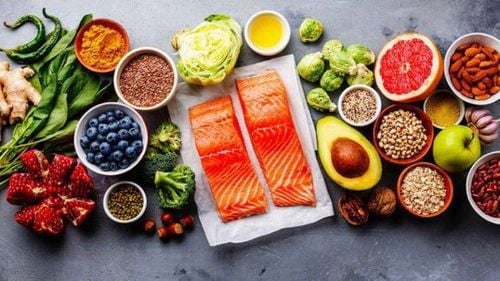
Chế độ ăn uống đóng vai trò quan trọng trong việc kiểm soát bệnh thận
If the kidneys are not working well, limit the use of whole grain breads, bran cereals and oatmeal, nuts, sunflower seeds. Depending on the stage of the disease, adjust the amount of phosphorus in accordance with the opinion of your doctor or nutritionist. When the kidneys are damaged, some fluid can be retained because the kidneys are not able to excrete fluid as they should. Too much fluid in the body can be dangerous because it causes high blood pressure, swelling, and heart failure.
Daily fluid intake depends on the stage of the disease and the extent of kidney damage. In addition, you should also limit sodium to reduce thirst. To quench your thirst you can also use gum, rinse your mouth or suck on an ice cube, mint or sugar-free hard candy.
1.4. Special Dietary Concerns Vitamins Following a kidney-friendly diet may mean you may not be getting the vitamins you need. Therefore, you need to supplement with special foods for kidney patients including: vitamin D, folic acid or special iron tablets to help prevent complications of kidney disease such as bone diseases and anemia. . Take the necessary vitamin supplements mentioned above with guidance and talk closely with your doctor to avoid causing other health problems by taking too much vitamin.
Follow a kidney-friendly eating plan with patients with co-diabetes For people with diabetes it is important to control blood sugar. This is even more important to avoid further damage to the kidneys with kidney disease. Diet for diabetics should pay attention to limit sodium, phosphorus, potassium and fluid
1.5. Find kidney-healthy recipes on Kidney Kitchen On the kidney kitchen you can dig deeper into what each nutrient means for people with kidney disease and which nutrients common foods contain how much quantity. Learn what healthy eating means for people with all stages of kidney disease including those on dialysis. Learn recipes on Kidney kitchen.
2. 20 best foods for people with kidney disease
Cauliflower Cauliflower is a food rich in fiber and other nutrients including vitamin C, vitamin K and folate (vitamin B9), a B vitamin. It also contains a mixture of anti-inflammatory substances such as indol and is commonly used as a dietary supplement. Use a potato substitute for a low-potassium side dish. One cup (124g) of cooked cauliflower contains:Sodium: 19 mg Potassium: 176 mg Phosphorus: 40 mg Blueberries Blueberries contain many healthy nutrients and are one of the best sources of nutrients. The best antioxidant you can eat. The antioxidants in blueberries are anthocyanins, which protect against heart disease, some cancers, cognitive decline, and diabetes. One cup (148g) of fresh blueberries contains:
Sodium: 1.5 mg Potassium: 114 mg Phosphorus: 18 mg Sea bass Sea bass is a high-quality, healthy source of protein and high in omega-3s. Omega-3s have many beneficial health effects including reducing inflammation, reducing the risk of cognitive decline, depression and anxiety, and are lower in phosphorus than other fish. In 85g of cooked sea bass, it contains:
Sodium: 74 mg Potassium: 279 mg Phosphorus: 211 mg
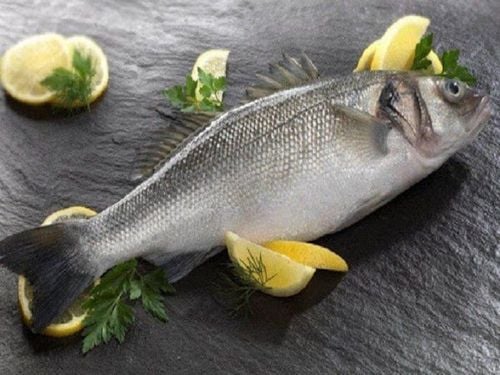
Bạn nên bổ sung cá vược vào chế độ ăn cho bệnh nhân bị bệnh thận
Sodium: 1.5 mg Potassium: 144 mg Phosphorus: 15 mg Egg white Although egg yolk has high nutritional value, it also contains a lot of phosphorus, which is not good. for people with kidney problems. Therefore, egg whites are an alternative that provides a source of high-quality, kidney-healthy protein with limited phosphorus. Large egg white (66g) contains:
Sodium: 110 mg Potassium: 108 mg Phosphorus: 10 mg Garlic Garlic is not only a great seasoning for meals, but it has long been known as a food. healthy products. They are high in manganese, vitamins C, B6 and sulfur compounds with anti-inflammatory properties. 3 cloves of garlic (9g) contains:
Sodium: 1.5 mg Potassium: 36 mg Phosphorus: 14 mg Buckwheat Buckwheat is one of the whole grains with high nutritional value and is suitable for people with diabetes. kidney problems because they contain less phosphorus. Half a cup (84g) of cooked buckwheat contains:
Sodium: 3.5 mg Potassium: 74 mg Phosphorus: 59 mg Olive oil Olive oil is a source of healthy fats, does not contain phosphorus, and is therefore a real source of food. The product is suitable for people with kidney problems. For people with end-stage kidney disease, keeping weight off can be difficult, so healthy, high-calorie foods like olive oil are a great choice. One tablespoon (13.5 g) of olive oil contains:
Sodium: 0.3 mg Potassium: 0.1 mg Phosphorus: 0 mg Bulgur is a great, gluten-free whole-wheat product. kidney diseases because it contains less phosphorus and potassium than other grains. This nutritious seed is a rich source of B vitamins, magnesium, iron and manganese. Half a cup (91g) of bulgur contains:
Sodium: 4.5 mg Potassium: 62 mg Phosphorus: 36 mg Cabbage Cabbage, a member of the cruciferous family, contains high levels of vitamin K, vitamin C, and a variety of B vitamins.Read More Plus, it provides insoluble fiber, good for the digestive tract, and low in potassium, phosphorus, and sodium. One cup (70g) of chopped cabbage contains:
Sodium: 13 mg Potassium: 119 mg Phosphorus: 18 mg
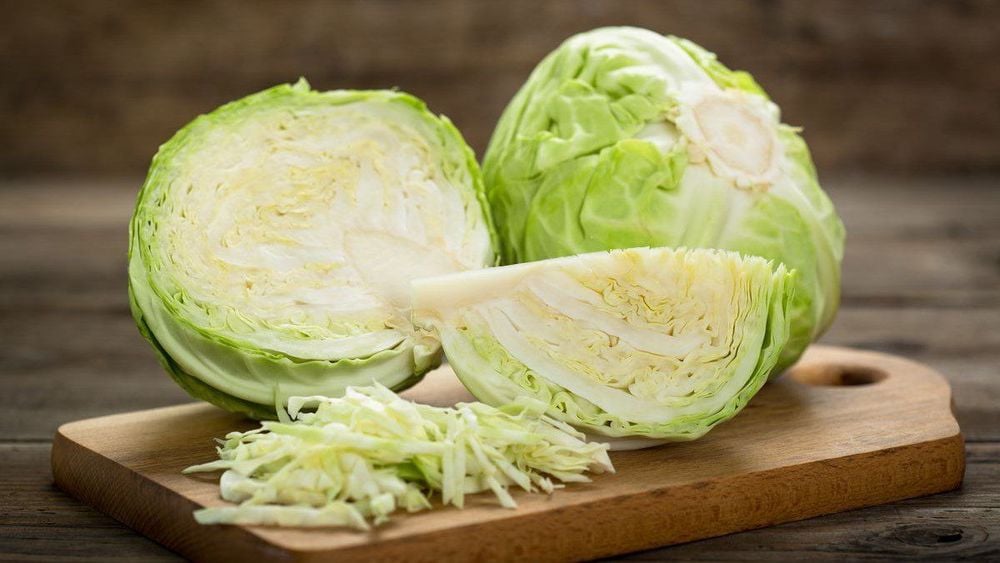
Bắp cải là loại thực phẩm dễ tìm, dễ chế biến và tốt cho bệnh thận
Sodium: 63 mg Potassium: 216 mg Phosphorus: 192 mg Bell peppers Bell peppers contain many valuable nutrients, and at the same time contain low amounts of potassium. Bell peppers are rich in vitamin C, a powerful antioxidant. In a small bell pepper (about 74 g) contains 5% more than the body's amount of Vitamin C. One small red bell pepper (74g) contains:
Sodium: 3 mg Potassium: 156 mg Phosphorus: 19 mg Onions Onions provide a sodium-free flavor to dishes for people with kidney disease. . Because, onions provide flavor to the dish, so it can replace salt and still ensure the taste of the dish. Furthermore, onions are rich in vitamin C, manganese, B vitamins as well as fiber that keep your digestive system healthy by providing nutrients to beneficial bacteria in the gut. One small onion (70g) contains:
Sodium: 3 mg Potassium: 102 mg Phosphorus: 20 mg Arugula Arugula is a green vegetable low in potassium and rich in nutrients. They are high in vitamin K, manganese, and calcium, all of which are important for bone health. The plant's nutritious green color is also high in nitrates, which have been shown to lower blood pressure – a boon for people with kidney disease. One cup (20g) of raw arugula contains:
Sodium: 6 mg Potassium: 74 mg Phosphorus: 10 mg Macadamia nuts are some of the nuts recommended for people with kidney disease by most seeds are rich in phosphorus. Similar to other nuts, macadamia nuts are packed with healthy fats, B vitamins, magnesium, copper, iron and manganese. In 28g (1 ounce) macadamia nuts contain:
Sodium: 1.4 mg Potassium: 103 mg Phosphorus: 53 mg Radish This is a crunchy vegetable, a good supplement for people with kidney disease. They are low in potassium, sodium, and phosphorus, but packed with other important nutrients. They are rich in vitamin C, which helps to prevent oxidation and reduce the risk of heart disease and cataracts. Half a cup (58g) of sliced turnips contains:
Sodium: 23 mg Potassium: 135 mg Phosphorus: 12 mg Turnips – a root Turnips is a root vegetable high in fiber and vitamin C, vitamin B6 and manganese. A variety of recipes, which can be boiled, roasted or mashed into a healthy side dish that works well for a kidney-friendly diet. Half a cup (78g) of cooked beets contains:
Sodium: 12.5 mg Potassium: 138 mg Phosphorus: 20 mg Pineapple Many tropical fruits such as oranges, bananas, kiwis are rich in potassium. Pineapple is a tropical fruit that is low in potassium for people with kidney problems. In addition, they are also rich in fiber, manganese, vitamin C and bromelain – an enzyme that helps reduce inflammation. One cup (165g) of pineapple contains:
Sodium: 2 mg Potassium: 180 mg Phosphorus: 13 mg
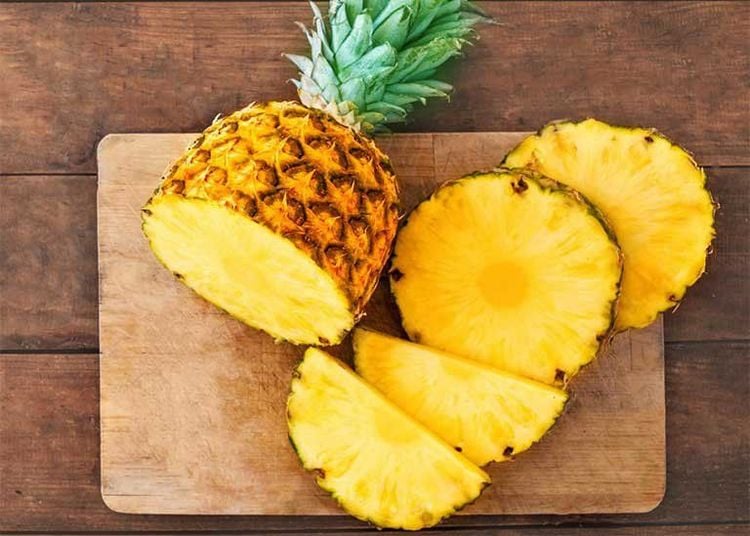
Một trong những loại thực phẩm bệnh nhân bệnh thận nên ăn là dứa
Sodium: 2 mg Potassium: 80 mg Phosphorus: 11 mg Shiitake mushrooms are a savory ingredient that can be used as a meat-based substitute. Vegetarian food for dieters or vegetarians who need to limit protein. They also provide a good amount of plant-based protein and fiber. The potassium content in shiitake mushrooms is lower than in portobello and white button mushrooms, which makes them a better choice for people with kidney disease. In 145g of cooked shiitake mushrooms contain:
Sodium: 6 mg Potassium: 170 mg Phosphorus: 42 mg
Please dial HOTLINE for more information or register for an appointment HERE. Download MyVinmec app to make appointments faster and to manage your bookings easily.
References: kidneyfund.org, medicalnewstoday.com, healthline.com





